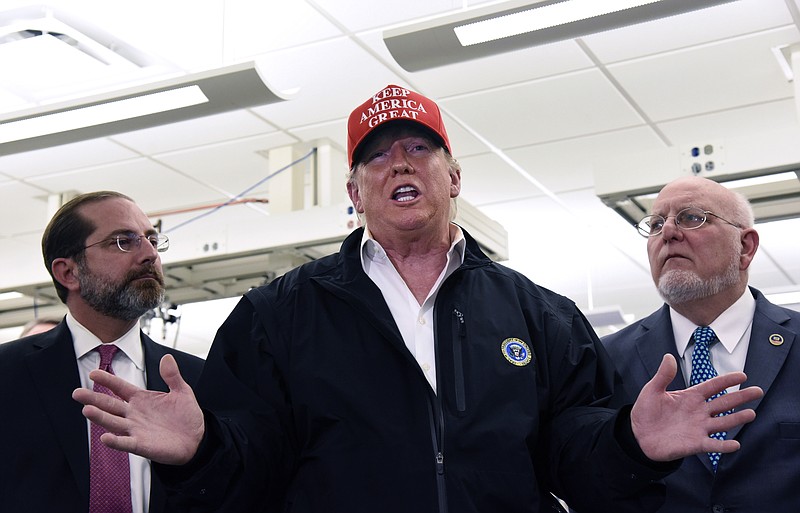Are we there yet? Are we at the intersection of fear and dread? Are we afraid yet? In some ways, yes.
We'd be foolish not to be concerned. On the other hand, just because coronavirus is popping up in counties and states all around us, and just because Monday's stock market sell-off was so steep that it triggered the market's self-imposed "circuit-breaker" rule that halts trading for 15 minutes so cooler heads might prevail - well, not even all of that taken together is cause for panic.
No, we don't know of any magic cures for this new virus, COVID-19, which already has infected more than 113,575 people worldwide, including four in Tennessee and 11 in Georgia, and killed about 4,000.
Nor do we know the cure for a volatile stock market - especially one influenced by warring oil barons in Saudi Arabia and Russia who are making their own moves amid fears the coronavirus epidemic will stymie their oil sales.
But take a breath. By comparison, flu has killed 18,000 in the United States this year alone. And surely America's economy is strong enough to weather two filling stations having a price war on the corner. After all, President Donald Trump is president and he knows more than the generals, more than the doctors and more than the economists. Besides, his aides planned to brief him on the stock market when he returned from golfing.
The United States this week is watching an acceleration in the pace of new coronavirus cases: Over the weekend, more than 230 cases were added, and on Monday, the national total had approached 600, with 22 deaths. Johns Hopkins Hospital's director of the Center for Health Security, Tom Inglesby, in a Washington briefing Monday afternoon said 78 of the U.S. cases "have no known link" to other confirmed cases.
Later in the briefing, Dr. Lisa Maragakis, senior director of infection prevention, said "it may be possible that the airborne route may also play a role," in spreading the virus, for which "there are not adequate numbers of tests" though many state labs are coming online to help, including Tennessee's.
There is some good news. The prospect of more sweeping measures to fight the spread of the virus is on the increase, primarily from state and city governments and from businesses taking their own initiatives.
* Inglesby addressed the elephant in the room: We may reach the point to closing down communities and businesses if this continues. China did that - but not soon enough. Italy, with its cases growing quickly around Milan, took that kind of action on Monday, locking down the entire country - the largest restriction on the free movement of people ever attempted in a Western democracy in peacetime, some say. Meanwhile, Israel announced a 14-day quarantine for all international arrivals, not just people traveling from countries with major outbreaks.
* Here in the states, several Republican members of Congress who at the recent conservative CPAC meeting had contact with a man now known to have COVID-19 have self quarantined themselves.
* On Monday Rick Cotton, the executive director of the Port Authority of New York and New Jersey, which operates the region's major airports, bridges, tunnels and bus terminals, tested positive for coronavirus, and New York Gov. Andrew M. Cuomo of New York announced it like a sentinel warning.
* Colleges and universities - like Columbia University and Barnard College in New York and Princeton in New Jersey - are shifting to remote classes.
* On Sunday, New York City Mayor Bill de Blasio said the city would offer no-interest loans to small businesses with fewer than 100 employees that could show a 25 percent reduction in sales since the outbreak and grants of as much as $6,000 for businesses with fewer than five employees.
Even amid the great concern, there are good things happening - signs of wise awareness and strategies for managing the fallout of the emerging pandemic.
What we clearly don't have is presidential leadership. For every strategy and announcement from medical experts, the president has sent a different message - like, "even, if you're sick" it's OK to go to work.
New York's Gov. Cuomo in particular has criticized the administration, blaming "mixed messages" from Trump and Vice President Mike Pence and for the delays in testing that Cuomo said kept New York from knowing the extent of the disease's spread.
Early Monday, Trump fired back, talking about the only things he knows: fiction and entertainment. Attacking Cuomo and his brother, Trump tweeted. "There are no mixed messages, only political weaponization by people like you and your brother, Fredo!"
It was a reference to CNN anchor Chris Cuomo, likening him to Fredo Corleone, the most ineffectual of the fictional brothers in the movie "The Godfather." That's a big help, don't you think? How very presidential.
If Trump were a capable president, he'd have said something like, "Not only are we prepared as a federal government, but you see the excellent examples of preparedness in states like New York ... "
Let us say again: The flu has killed 18,000 in the United States this year alone, far more than the coronavirus' 4,000 deaths worldwide. But here's the catch. There is a vaccine to protect against flu. And there are standardized treatments and anti-viral medications we know are effective to stem the flu.
That makes it all the more important to raise awareness of COVID-19 while not stoking panic.
We'd be foolish not to be concerned, but we also would be foolish to give in to panic. Likewise, we would be foolish to expect this president to be of much help.
